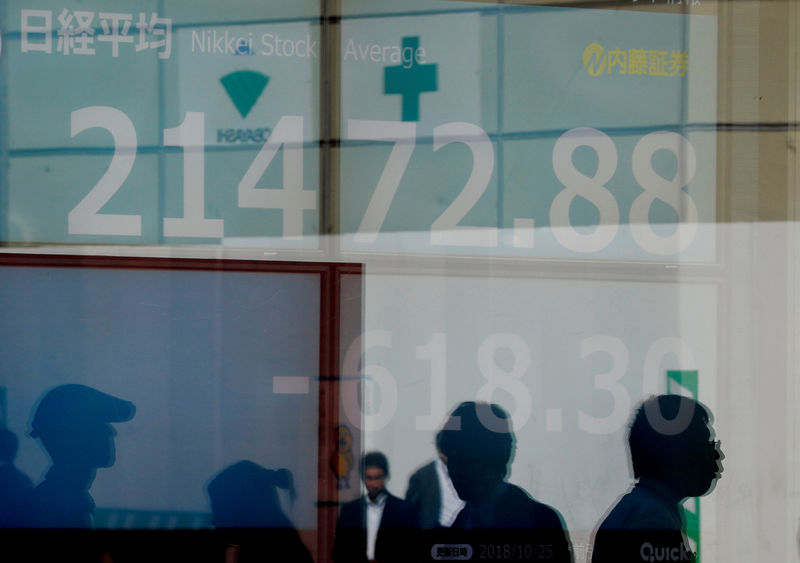By Swati Pandey
SYDNEY (Reuters) - Asian shares plunged on Thursday as hundreds of billions of dollars haemorrhaged from global markets after a rout in tech stocks inflicted the largest daily decline on Wall Street since 2011, wiping out all its gains for the year.
Stock investors have become increasingly nervous about lofty equities valuations, a likely peak in corporate earnings momentum, faster rate hikes in the United States and an ongoing Sino-U.S. trade war that threatens to hurt world growth.
MSCI's broadest index of Asia-Pacific shares outside Japan (MIAPJ0000PUS) has fallen more than 18.5 percent so far this year after skidding almost 2 percent on Thursday.
Japan's Nikkei (N225) tumbled 3.3 percent to a six-month trough while Australian shares (AXJO) hit a more than one-year low. Tokyo's Topix index (TOPX) tumbled 3 percent, evaporating more than $155 billion in market value.
Chinese shares were in the red too with the blue-chip SSE (LON:SSE) Composite index (SSEC) plummeting 2.5 percent as fresh market-support measures by the Chinese government failed to ease investor worries about high leverage and the Sino-U.S. trade war.
Hong Kong's Hang Seng index (HSI) sank 2.2 percent.
"If you’re a company and you’re in charge of a capex budget there is so much uncertainty about the next few years in terms of a trade war, in terms of Brexit," said Jim McCafferty, head of Equity Research, Asia ex-Japan at Nomura.
"How, as a management team, will you decide how much capex to invest and where to invest it?"
Some analysts feel equity bears may be better off focussing outside the United States, at least for now.
"The pressure points in Europe have been flagging bearish conditions for the better part of the past two months," said James Stanley, market strategist at DailyFX.
"If there is going to be a larger equity sell-off, then markets would likely see some element of correlation amongst equity indices and picking on the particularly weak areas of the market may prove to be a more amenable approach."
The return of the bears has already been more pronounced outside the United States, according to data analysed by Reuters. In addition, a Bank of America (NYSE:BAC) Merrill Lynch study recently found that 58 percent of the 2,767 stocks in MSCI's global index are now in bear market territory.
Weak readings on manufacturing in Europe have added to angst over world growth, as has a surprise slump in U.S. home sales, which suggested rising mortgage rates were sapping demand for housing.
Adding to the air of tension, police intercepted suspected bombs mailed to former U.S. President Barack Obama, Hillary Clinton and other high-profile Democrats, as well as to CNN, in what New York officials branded an act of terrorism.
The growing international pressure on Saudi Arabia over the death of journalist Jamal Khashoggi also weighed on investor sentiment.
On the trade front, disappointing forecasts from industrial bellwether Caterpillar (N:CAT) weighed on Wall Street as the giant warned of rising costs due to U.S. import tariffs.
"Now that markets have some element of the confirmation that tariffs are bringing actual impact to U.S. corporates, there may be a snowflake causing the avalanche scenario as just another factor of worry that now needs to be taken into consideration," DailyFX's Stanley said.
The Nasdaq (IXIC) closed down 12.4 percent from its Aug. 29 record closing high, falling 4.4 percent on Wednesday in its biggest one-day percentage decline since Aug. 18, 2011. In dollar terms, the Nasdaq vaporised $524 billion in market capitalisation overnight.
The Dow (DJI) fell 2.41 percent and the S&P 500 (SPX) lost 3.09 percent.
Also weighing on sentiment, Citi lowered its global growth forecast for both 2019 and 2020 by 0.1 percentage point each to 3.2 percent and 3 percent, respectively, it said in a note Thursday, citing policy tightening by the U.S. Federal Reserve.
CURRENCIES
In foreign exchange markets, client participation on both spot and options was fairly light, Citi noted in a separate note.
Funds flowed to the U.S. dollar and Treasuries and out of the euro and the British pound.
The euro shed 0.7 percent to $1.1397 (EUR=) and breached a major chart bulwark at $1.1430. It was last up 0.2 percent at $1.1409.
Against a basket of currencies, the dollar eased from near a nine-week peak to 96.267 (DXY). [USD/]
Sterling hit a seven-week trough $1.2865
The yen got the usual safe-haven bid, with the euro skidding to a two-month low at 127.68 yen (EURJPY=). Even the high-flying dollar eased to 112.08 yen
Oil prices slipped amid concerns over global growth. Brent crude (LCOc1) fell 52 cents to $75.65 a barrel, while U.S. crude dropped 53 cents to $66.29 (CLc1). [O/R]

Spot gold